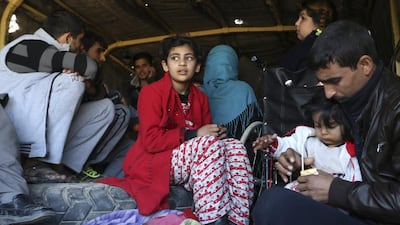RAMADI // Six times in the past harrowing month, Umm Omar and her family heard a knock on the door of whatever home they were occupying in Ramadi: it was an ISIL militant, she said, ordering them to pick up and move with them as human shields because the Iraqi army was approaching.
“Every time the army would advance, Daesh would knock on our door and say, ‘OK, time to go’,” the woman said.
The knock came again on Thursday morning in the Soufiya neighborhood of north-eastern Ramadi, Umm Omar said, and to her surprise it was the counter-terrorism forces of the Iraqi military. She and about 60 other people had been rescued.
It was still a little unclear to her what happened to the extremists who had held Ramadi since May, said the woman, who fears her relatives may be trapped in the city.
Either all the ISIL fighters were killed during clashes on Wednesday night, or they had fled further into the neighbourhood and did not have time to take their captives along.
The fall of Ramadi, the capital of sprawling Anbar province, was the biggest setback for Iraq’s military since the city of Mosul fell to ISIL in the summer of 2014.
Iraqi troops, working with the elite Counter-Terrorism Service (CTS), retook the centre of Ramadi last month with heavy air support from the US-led coalition.
Ramadi cannot be considered fully liberated, with pockets of ISIL fighters remaining in half to two-thirds of its neighbourhoods in the east and north.
As Iraqi forces advanced from west to east in December, the extremists pulled back with their civilian captives as shields, leaving behind houses booby-trapped with explosives and roadside bombs.
Fighters with the CTS forces that are leading operations in Ramadi, 115 kilometres west of Baghdad, said the practice is slowing them down and complicating an already messy challenge of house-to-house warfare.
“The main problem now are the civilians, that is what’s slowing our progress,” said Maj Gen Fadhil Barwari, the commander of the CTS unit in Ramadi.
“We thought it was going to be easier because we have air strikes and air support,” he said. “But now, when the pilot sees civilians, they don’t strike.”
Unlike other Iraqi cities where troops have pushed out the militants, such as Tikrit and Beiji, thousands of civilians remained in Ramadi under months of ISIL rule. While the US-trained CTS is the most effective unit in the Iraqi military, it still largely depends on air support to retake ground.
In Soufiya, on the north-eastern edge of the city centre, Maj Gen Barwari’s men slowly combed blocks of low-rise homes surrounded by palm trees. Above them, two Iraqi military helicopters circled along the front line, firing in advance of comrades in a dozen Humvees. By that afternoon, only a single coalition air strike had targeted the front line.
On the day before the fall of Sinjar, coalition planes launched 24 air strikes on the town in 24 hours. In Ramadi, a city five times the size of Sinjar, coalition planes were only averaging four strikes a day in the week before the city centre fell.
Maj Gen Barwari said his men have moved more than 3,000 people out of Ramadi, and he estimated that thousands remained. The rescues and evacuations are draining resources and not only slowing progress in Ramadi but also across the Euphrates River valley, he said.
Watching the battle in Ramadi via reconnaissance drones, Col Steve Warren, the Baghdad-based spokesman for the US-led coalition, said he has seen ISIL militants “herding civilians” over toward the Soufiya neighbourhood.
“It hasn’t significantly slowed operations, but yeah, it’s slowed to a degree,” Col Warren said.
While ISIL hides among civilians in the cities they control, this is the first time the coalition has seen militants moving families with them as they retreat. Like the elaborate networks of tunnels found in Kobani and Sinjar after those towns were cleared of extremists, the group’s practice of using human shields as they retreat is aimed at diminishing the effectiveness of a strategy that relies heavily on air strikes.
Asked whether this practice could complicate plans to retake cities like Mosul and Raqqa with much larger civilian populations, Col Warren said: “It’s too early to tell.”
“What we don’t know is if this is a tactic or an act of desperate men.”
* Associated Press

